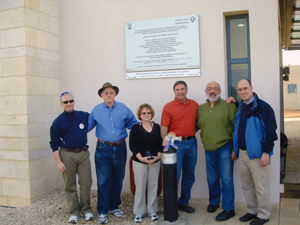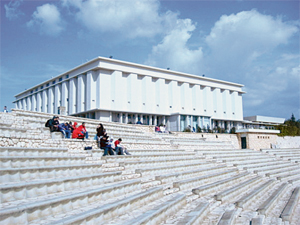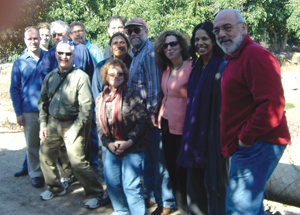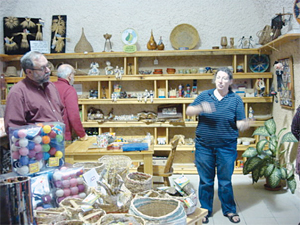 [by Shiela Steinman Wallace]
[by Shiela Steinman Wallace]
Many of Louisville’s Klei Kodesh (Jewish clergy) visit Israel regularly and have deep connections with the Jewish State. Those connections are particularly strong with the Western Galilee, the Jewish Community of Louisville’s Partnership with Israel region.
From February 8-14, Rabbi Stanley Miles led a Central Area Consortium mission for Klei Kodesh and congregational leaders to the Western Galilee, and Cantor David Lipp was one of the participants.
“I think I’m the only Jew living who doesn’t have any relatives in Israel,” Rabbi Miles quipped. “That being said, this was my fourth or fifth encounter with the Partnership, and as much as I love Israel and love being there, being in our Partnership region gives me a sense of family.
“There are people and institutions in the Western Galilee that inspire me every time I encounter them,” he continued, “from the Shop of Meaning where people have the opportunity to rebuild their lives and self esteem to the medical skill and courage at the Western Galilee Hospital.
Cantor Lipp also finds inspiration and enjoys close connections in the Western Galilee. “About two years ago, when I took a congregational trip to Israel,” he explained, the Partnership partnered my families up with students at Kivunim, an organization which trains physically disabled youth who are exempted from the army to be independent adults, and we were hosted by them in their homes. That was very meaningful; and it was nice to see, almost two years later that one of the many projects they use to train these young people was up and running and beautiful.”
 At that project, the Shop of Meaning, where Kivunim participants are taught how to run a business, Cantor Lipp noted, “I believe I spent more money in that one place than any other member of our delegation. They had a lot of what we would call ‘fair trade’ items – olive oil, honey and soap made with all sorts of natural ingredients, that were jointly produced in Nablus in the West Bank and in the Western Galilee.”
At that project, the Shop of Meaning, where Kivunim participants are taught how to run a business, Cantor Lipp noted, “I believe I spent more money in that one place than any other member of our delegation. They had a lot of what we would call ‘fair trade’ items – olive oil, honey and soap made with all sorts of natural ingredients, that were jointly produced in Nablus in the West Bank and in the Western Galilee.”
“One of the things that hit home for me in the Partnership area called Matei Asher,” Rabbi Miles said, “is the military command center. When I think of a military command center, I think of tanks and guns, but the Matei Asher Center is a series of computers with alarm systems given to every citizen in every home in the region. This brought home to me the fact that in Israel and in the Partnership, the security of every person is of immense value. I cannot imagine every home in Louisville, KY, connected to our police department in case of intrusion, but in our Partnership area, it’s a fact of life.”
The Western Galilee is working hard to improve the quality of life in Israel. Cantor Lipp reported the group visited Western Galilee College and met with Dean of Students Dr. Yehuda Ben Simon, “and one of the initiatives the Development Subcommittee is working on is called Iarael 15.
“There is an international index of livability assigned to each country,” he explained, and Israel is ranked in the mid to upper 30s. “Their aim is within 10 years to move Israel to number 15. In order to do that, they’ve been pulling together meetings of all sorts of different people – artists, government ministers, academics, business people, teacher, people on the street – and having periodic brainstorming sessions to develop a way to get from here to there. … At these meetings, they have always made sure to have at least one regional American member present to be part of the conversation.”
 “Western Galilee Hospital is an amazing operation,” Cantor Lipp said. He was impressed with the things they do, their preparedness and the kinds of drills they do. For example, he pointed out, in a matter of minutes, they can convert their parking lot into a chemical decontamination facility.
“Western Galilee Hospital is an amazing operation,” Cantor Lipp said. He was impressed with the things they do, their preparedness and the kinds of drills they do. For example, he pointed out, in a matter of minutes, they can convert their parking lot into a chemical decontamination facility.
Mission participants also had the opportunity to visit the congregations nearest the Western Galilee that are affiliated with their streams of Judaism. Cantor Lipp went to Kfar Veradim where he met with Rabbi Tzvi Berger in his home.
There is a lot of tension between the Orthodox community in Israel and the other streams. Cantor Lipp recounted a story Rabbi Berger’s synagogue president (who is a native Israeli) told him that highlights that tension. “The town council had asked the growing Masorti (Conservative) congregation to take over the community Seder from Chabad. His answer was, we don’t do that however, if there are any members of the community who need a place to go for Seder, we will match them up with a family so they will have a place to go.” The Conservative group recognized that this was a valuable community service provided by the other group and were unwilling to “pull the rug out” from under them.
Rabbi Miles visited Congregation Emet V’Shalom in Nahariya. “I was happy to see that the congregation was still in the home that they acquired after the second Lebanon war in 2006,” he said, “and many of their programs are programs that I see in our congregations here in Louisville. But I also see the frustration of people in the Partnership area because they are in the extreme northern sector of Israel and feel somewhat isolated from the mainstream in both Jerusalem and Tel Aviv.”
The group also spent some time in Jerusalem.
 “I had a sense of tension in Israel in some respects,” Rabbi Miles said, “and in other respects there was a relaxation that I found rather disconcerting. Of course the threat of Iran is on everyone’s mind, but when we visited Machane Yehuda in Jerusalem, the only soldiers I saw were eating falafel. The last time I visited on the community mission in September 2008, there was a strong military presence.
“I had a sense of tension in Israel in some respects,” Rabbi Miles said, “and in other respects there was a relaxation that I found rather disconcerting. Of course the threat of Iran is on everyone’s mind, but when we visited Machane Yehuda in Jerusalem, the only soldiers I saw were eating falafel. The last time I visited on the community mission in September 2008, there was a strong military presence.
“I asked our guide, Julian Resnik, what’s going on,” he continued. “His answer, simple and to the point: the security barrier works well.
“One of the things that always amazes me about Israel in general is the amount of change” there is, Cantor Lipp observed. “I was there six months ago, and it has changed. The light rail is much cleaner and looks totally different, and the new bridge in Jerusalem is nicer and more complete.
Cantor Lipp and Rabbi Miles also enjoyed seeing Louisvillians and former Louisvillians in Israel, including Peter Anik, Alexandra Shklar, Jackie Wolff, Alex Udis, Max Goldstein, Amy Goldstein Danino and Monica Meyer (who is not technically a Louisvillian but her grandparents, Ilse and Mike Meyer, aleihem hashalom, were).
Rabbi Miles summed up the experience, “When we view Israel, we of course look at the past with this being the land promised us by God and the cradle of our religion. We also look at the present, the dream of 2,000 years, the hope of 2,000 years. Hatikvah is being realized but the future is what shows the most promise because of the miracle of this country.”


